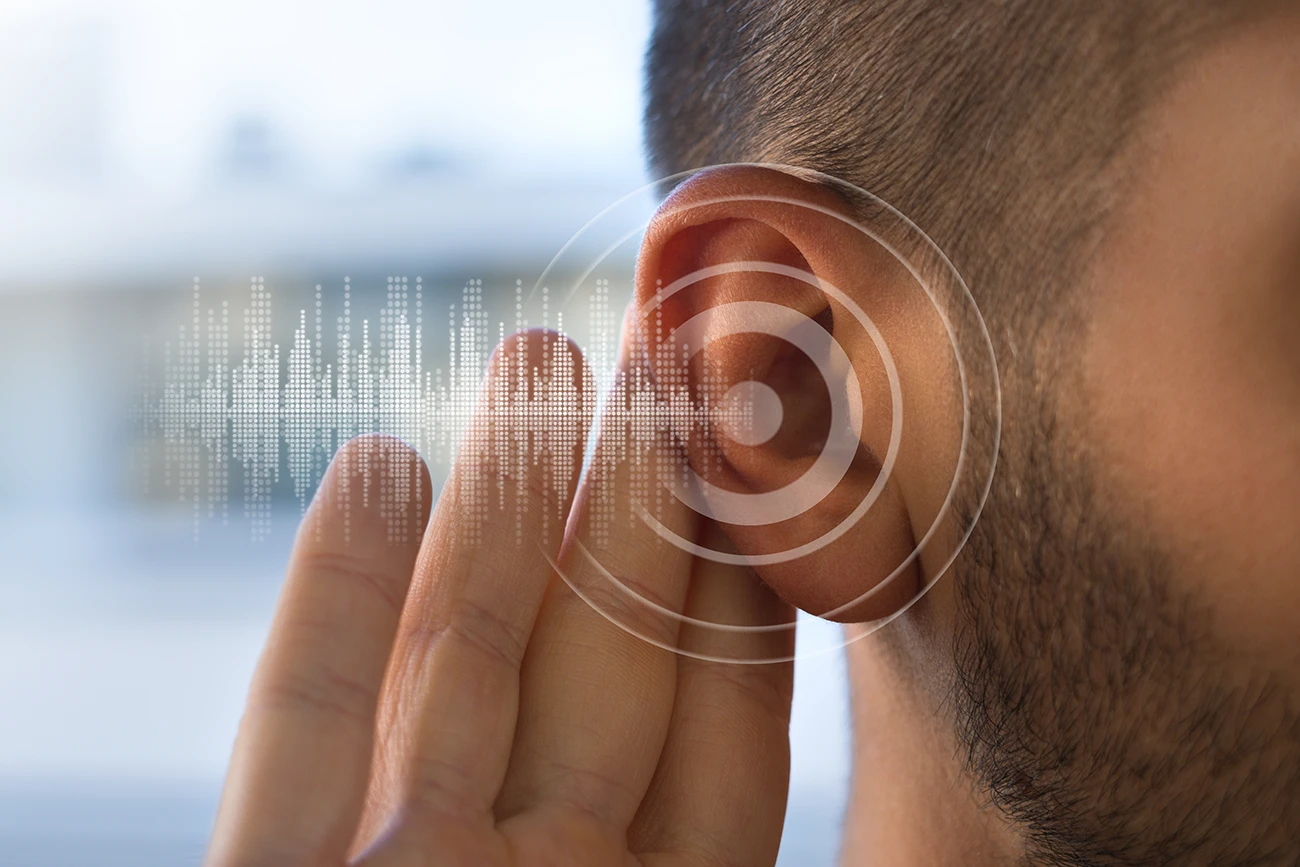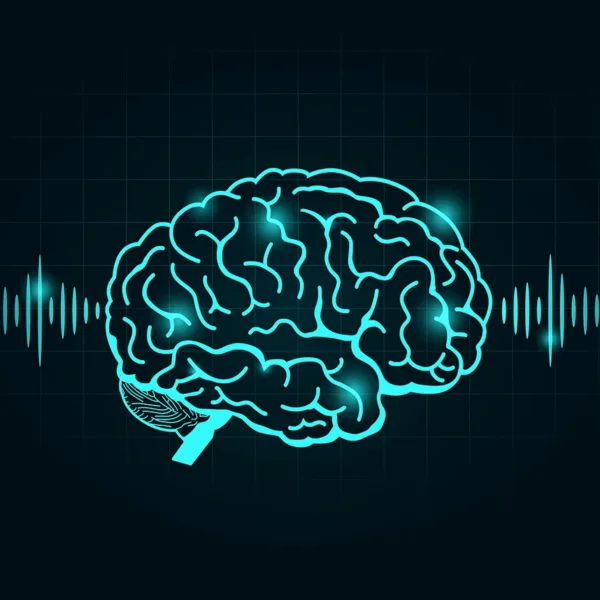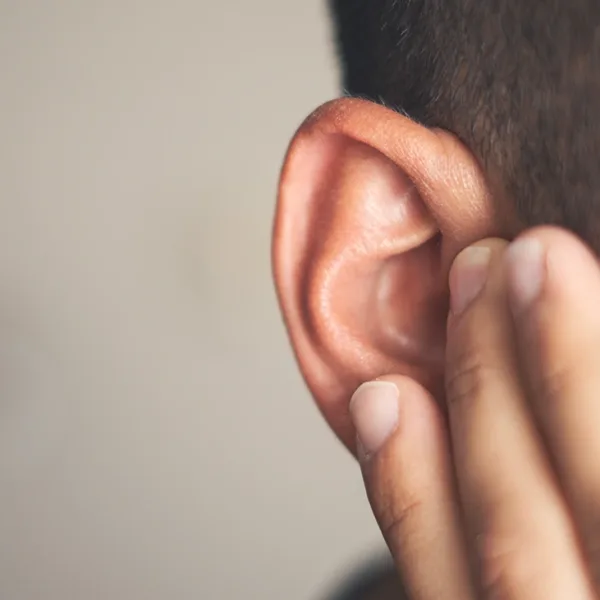
Imagine waking up one morning and realizing you can’t hear out of one ear. Sounds are muffled, voices seem far away, and you may even feel a little dizzy. Sudden hearing loss can be a frightening experience, and it may also be more common than we realize.
Although estimates suggest it affects between 1 and 6 people per 5,000 every year, experts believe the true number of annual sudden hearing loss cases is much higher because it often goes undiagnosed.1 This is one of the many reasons why staying aware of both the symptoms and causes of rapid-onset hearing loss is so important.
In this guide, we explain what sudden hearing loss is, key symptoms to watch for, common causes, and available treatment options.
What Is Sudden Hearing Loss?
Sudden hearing loss is the rapid onset of hearing loss that can develop over a few days, within hours, or even instantly. This condition often affects only one ear (unilateral), but it can occur in both ears (bilateral).
Any hearing loss that develops rapidly in one or both ears should be treated as a medical emergency.
Symptoms of Sudden Hearing Loss
Symptoms of sudden hearing loss can occur in one or both ears. Some people may hear a loud ‘pop’ right before their hearing fades, while others simply wake up with noticeable hearing difficulty.
Other common signs of sudden hearing loss include:
- Muffled or distorted sound in one or both ears
- A feeling of fullness or pressure in the ear
- Difficulty understanding speech
- Dizziness or balance problems (vertigo)
- Ringing, buzzing, or whooshing sounds in the ear (tinnitus)
If you or a loved one are experiencing any of these symptoms, it’s important to seek medical care immediately.
Types of Sudden Hearing Loss
Depending on the specific cause of the condition, sudden hearing loss can be categorized as sensorineural (damage to the inner ear), conductive (issues with the outer or middle ear), or a mix of both:
- Sensorineural hearing loss (SNHL): hearing loss caused by damage to the inner ear hair cells or auditory nerve.
- Conductive hearing loss (CHL): hearing loss caused by physical blockages or damage in the middle or outer ear (earwax buildup, abnormal bone growth, etc.).
- Mixed hearing loss: a mix of both sensorineural and conductive hearing loss.
Causes of Sudden Sensorineural Hearing Loss (SSHL)
Sensorineural hearing loss (SNHL) is the most common type of hearing loss. It is typically caused by damage to the auditory nerve, or the fragile hair cells in our inner ear. When the symptoms of this damage occur rapidly, it’s classified as sudden sensorineural hearing loss (SSHL).
Below are some of the most common causes linked to SSHL.
Acoustic Trauma
Sudden hearing loss can sometimes be caused by exposure to extremely loud sounds. This is known as acute acoustic trauma (AAT) and is an extreme form of noise-induced hearing loss (NIHL).
Any sound at or above 120 decibels (dB) can cause immediate hearing loss, including:
- Gunshots
- Fireworks
- Jet plane taking off
- Loud concerts
- Thunder
- Chainsaws
It is also common to experience temporary threshold shifts (TTS) after exposure to loud noise. TTS typically manifests as a sudden onset of muffled hearing or ringing in the ears that goes away after a few hours or days.
However, repeated TTS can permanently damage your hearing over time, resulting in noise-induced hearing loss.
Underlying Health Conditions
Some underlying health conditions can damage the inner ear or auditory nerve, resulting in sudden sensorineural hearing loss. This includes:
- Ménière’s disease: An inner ear disorder characterized by vertigo, ringing in the ears (tinnitus), and hearing loss that fluctuates suddenly.2
- Autoimmune disorders: Some autoimmune conditions like rheumatoid arthritis or multiple sclerosis cause the immune system to attack its own tissues. In some cases, they may target the inner ear or auditory nerve, leading to hearing loss.3
- Lyme disease: A bacterial infection most often transmitted by ticks, which can cause chronic inflammation and damage to the nerves responsible for hearing. One study found that 10.5% of patients experiencing sudden hearing loss had Lyme disease.4
- Diabetes: High blood sugar levels can damage nerves and blood vessels, including those in the inner ear. People with diabetes are twice as likely to experience SSHL.5
- High blood pressure (Hypertension): High blood pressure can cause blood vessels in the inner ear to rupture, leading to sudden hearing loss.6
These are just a few of the potential underlying health conditions that can contribute to sudden hearing loss. If you or a loved one are experiencing SSHL, it’s important to seek professional care as soon as possible to identify possible health concerns and receive timely treatment.
Ototoxic Medications
Some medications are ototoxic, meaning they have a toxic effect on the inner ear that can potentially result in permanent hearing loss. Ototoxic hearing loss can either develop gradually or suddenly, depending on the medication dosage and length of time it is taken.
There are over 200 medications known to have ototoxic effects7 including certain:
- Over-the-counter painkillers
- Antibiotics
- Chemotherapy drugs
- Loop diuretics
- Quinine-based herbal supplements
Typically, the higher the dose or length of exposure, the quicker hearing loss will develop. While stopping an ototoxic medicine can prevent further damage, there is currently no way to reverse medicine-induced hearing loss.
Acoustic Neuroma (Vestibular Schwannoma)
An acoustic neuroma is a type of benign (noncancerous) brain tumor, also called a vestibular schwannoma. Research suggests that sudden hearing loss occurs in about 26% of acoustic neuroma cases.8
There is an artery in the brain that supplies blood to the inner ear. In some acoustic neuroma cases, the tumor presses against this artery, restricting the blood flow resulting in sudden hearing loss.
Stokes
Sudden hearing loss is a common risk associated with strokes (cerebrovascular accidents). According to research, stroke patients are at a 71% higher risk of developing SNHL compared to non-stroke patients.9
Strokes happen when there are problems with blood flow to the brain, such as blood clots (ischemic stroke) or burst blood vessels (hemorrhagic stroke). Both types of strokes can also cause sudden sensorineural hearing loss.
Sudden hearing loss can either be a warning sign for a stroke (indicating problems with blood flow to the brain) or an effect of the stroke itself.
Causes of Sudden Conductive Hearing Loss
Conductive hearing loss (CHL) occurs when physical obstructions in the outer or middle ear interfere with hearing. These obstructions can be caused by injuries, earwax buildup, and more.
Below are some of the most common causes of sudden conductive hearing loss.
Middle Ear Infections (Otitis Media)
Middle ear infections, also known as otitis media, happen when viral or bacterial infections cause inflammation and fluid buildup in the middle ear. These infections can block sound from reaching the inner ear, making things difficult to hear.
With proper care, this form of sudden hearing loss is usually temporary. However, frequent ear infections can cause permanent damage over time.
Earwax Buildup (Cerumen)
Earwax (cerumen) is naturally produced by glands in the ear canal to protect, clean, and lubricate our ears. However, when too much earwax accumulates or becomes impacted, it can block the ear canal, leading to temporary hearing loss that may seem to occur suddenly.
Traumatic Injury
Traumatic injuries to the head, face, or jaw can result in damage to the tiny ossicle bones in your middle ear. These three bones (malleus, incus, and stapes) transmit sound vibrations from the eardrum to the inner ear, allowing us to hear.
Damage to these important structures interferes with the way sound is transmitted to your brain, resulting in sudden hearing loss.
Ear Barotrauma
Have you ever felt your ears pop while flying in an airplane or after diving into a pool? When water or air pressure changes too quickly, sometimes the pressure in your inner ear doesn’t have time to equalize, causing the eardrum to stretch or bulge.
This is called ear barotrauma, and can manifest as ear pain, discomfort, a feeling of fullness, or the need to “pop” your ears. In some cases, it can even cause sudden hearing loss.
Typically, hearing loss caused by ear barotrauma is only temporary and may fade within a few hours or days. However, severe cases may rupture the eardrum, which can cause permanent hearing damage.
Sudden Hearing Loss Treatments
If you or a loved one experiences sudden hearing loss, seeking medical attention as soon as possible is crucial. Early treatment improves the chances of recovery and prevention of further damage.
Treatment options for sudden hearing loss will vary depending on the underlying cause, but may include:
- Antibiotics or antivirals for infections
- Corticosteroids to reduce inflammation in the inner ears
- Immunosuppressive drugs for autoimmune-related hearing loss
- Vasodilators or hyperbaric oxygen therapy (HBOT) for circulation issues
In some mild cases, hearing may return all on its own, but seeking immediate medical care is still crucial. If permanent hearing damage does occur, prescription hearing aids are a reliable treatment option to improve daily communication and quality of life.
Safeguard Your Hearing with the Personalized Care You Deserve
Sudden hearing loss can be a disorienting experience, but you are not alone. If you or a loved one are experiencing symptoms of sudden hearing loss, or believe you may be at risk, it’s important to seek professional care right away.
At Audibel, our friendly and knowledgeable hearing care specialists are ready to help you navigate all your hearing care needs. Find an Audibel clinic near you and schedule an appointment today.
References
- Sudden deafness. (2018, September 14). NIDCD. https://www.nidcd.nih.gov/health/sudden-deafness
- What is Ménière’s disease? — diagnosis and treatment. (2024, August 15). NIDCD. https://www.nidcd.nih.gov/health/menieres-disease
- Li, X., Cao, Z., Chen, F., Yang, D., & Zhao, F. (2023). Sensorineural Hearing loss in Autoimmune Diseases: A Systematic review and Meta-analysis. The Journal of International Advanced Otology, 19(4), 277–282. https://doi.org/10.5152/iao.2023.22991
- Sowula, K., Szaleniec, J., Stolcman, K., Ceranowicz, P., Kocoń, S., & Tomik, J. (2021b). Association between Sudden Sensorineural Hearing Loss and Lyme Disease. Journal of Clinical Medicine, 10(5), 1130. https://doi.org/10.3390/jcm10051130
- Diabetes and Hearing loss | American Diabetes Association. (n.d.). https://diabetes.org/about-diabetes/complications/hearing-loss/diabetes-and-hearing-loss
- Agarwal, S., Mishra, A., Jagade, M., Kasbekar, V., & Nagle, S. K. (2013b). Effects of hypertension on hearing. Indian Journal of Otolaryngology and Head & Neck Surgery, 65(S3), 614–618. https://doi.org/10.1007/s12070-013-0630-1
- American Speech-Language-Hearing Association. (n.d.). Ototoxic medications (Medication effects). https://www.asha.org/public/hearing/ototoxic-medications/?_gl=1*qeet0j*_gcl_au*MjA4MTEzMDc1OC4xNzQzNTIzNzA5
- Nascentes, S. M., De Oliveira Henrique Paulo, E. A., De Andrade, E. C., Da Silva, A. L., Vassoler, T. M. F., & Scanavini, A. B. A. (2007b). Sudden deafness as a presenting symptom of acoustic neuroma: case report. Brazilian Journal of Otorhinolaryngology, 73(5), 713–716. https://doi.org/10.1016/s1808-8694(15)30134-8
- Kuo, C., Shiao, A., Wang, S., Chang, W., & Lin, Y. (2016). Risk of sudden sensorineural hearing loss in stroke patients. Medicine, 95(36), e4841. https://doi.org/10.1097/md.0000000000004841







Have a question or Comment?